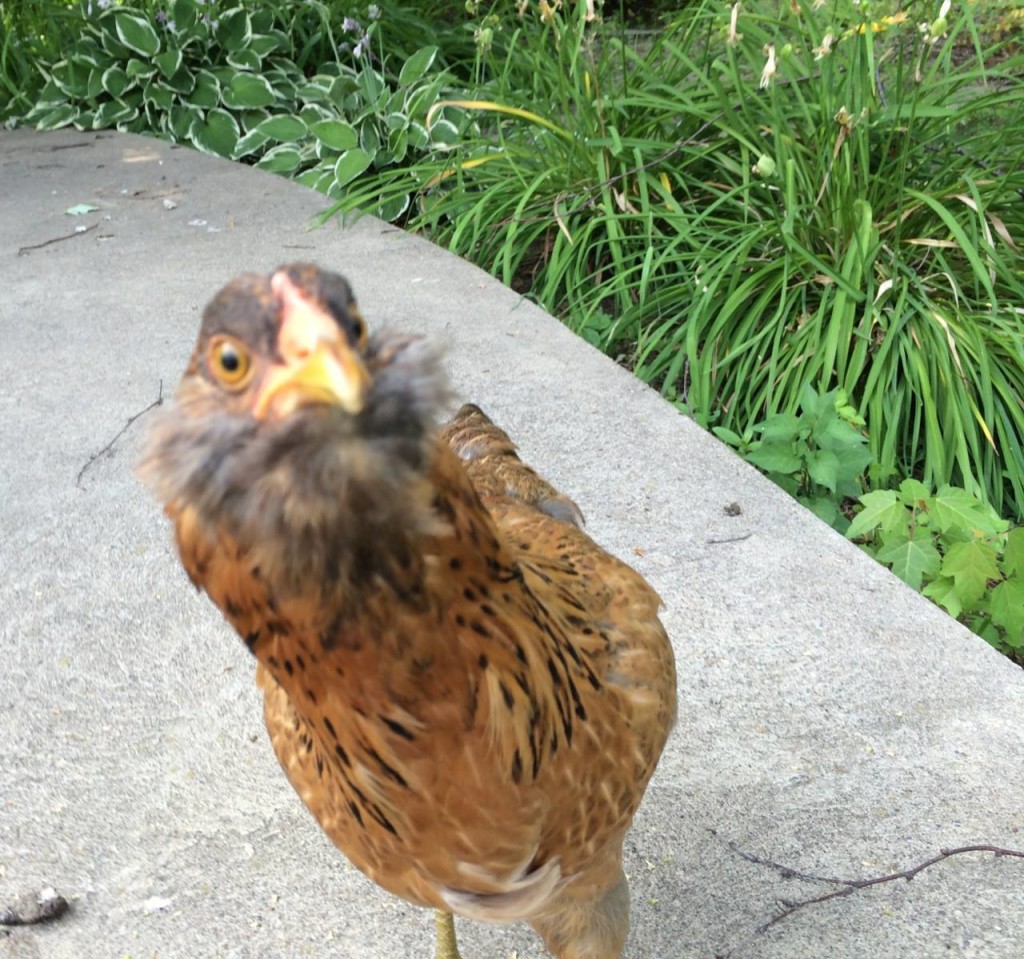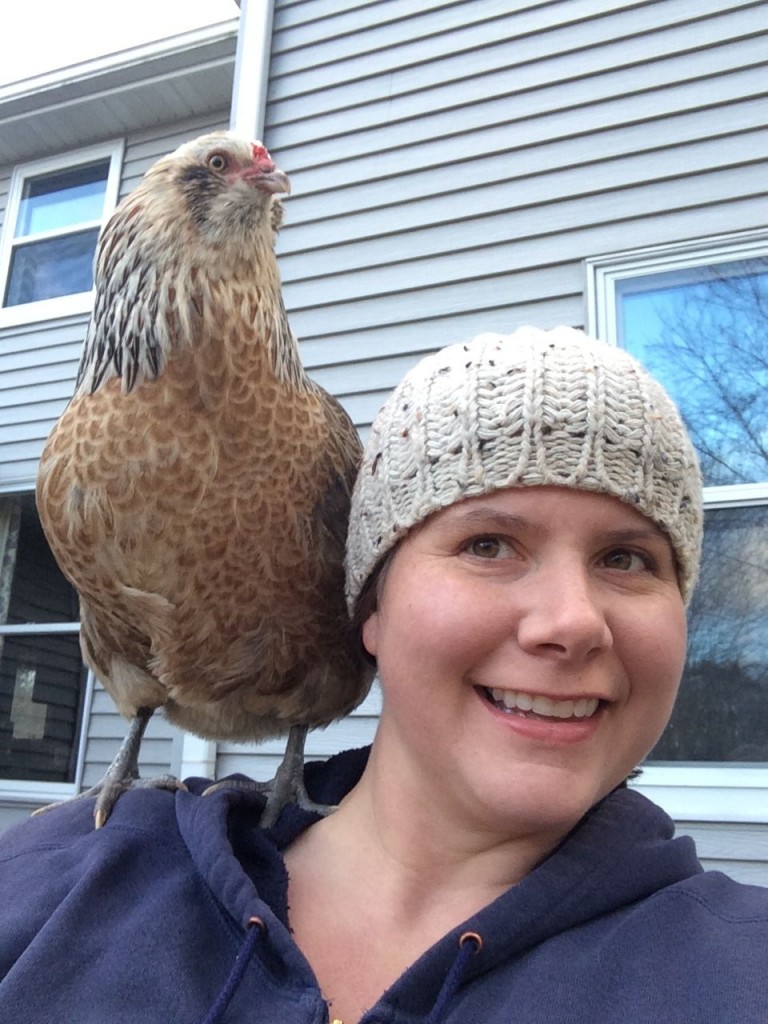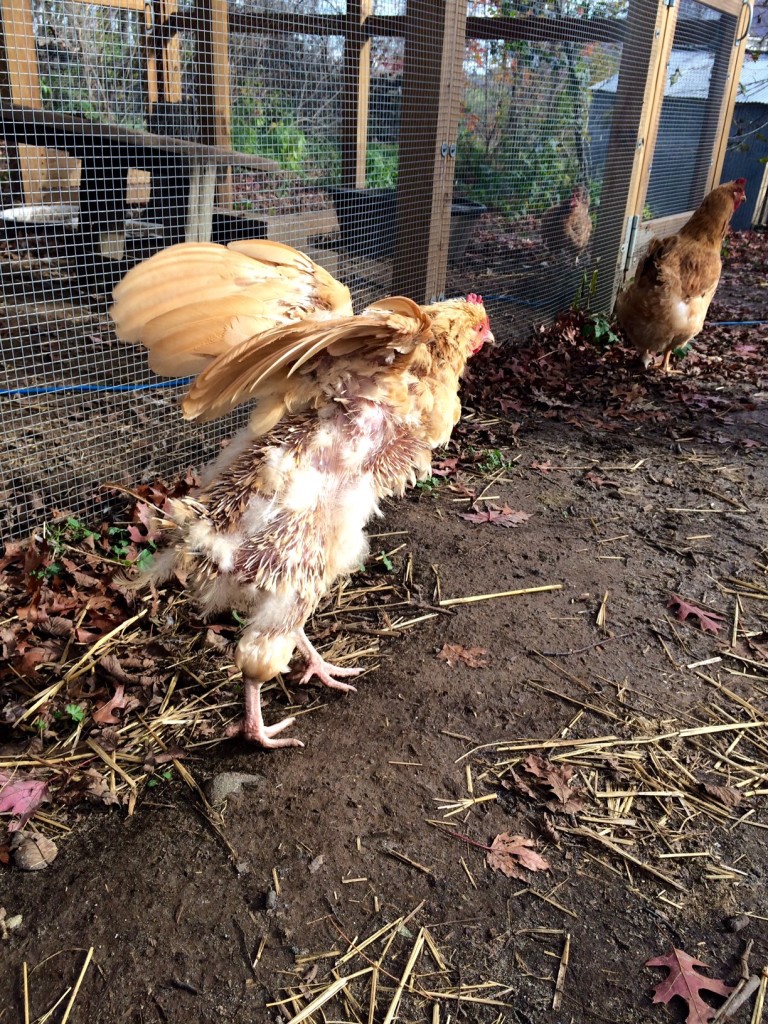Chicken Behavior During Molting… or, Why Have My Chickens Gone Crazy?!

Not only do they provide us with meat and eggs, but chickens are pure homestead entertainment! Spending even a few minutes out in the fresh air and sunshine with these birds will always put a smile on my face. I love just watching them- and actually, keeping an astute eye on them is part fun and part necessity.
Knowing their normal behavior (and they’re all different!) is the key to knowing when something is off, and being able to intervene if they’re sick, before it’s too late.
Lately a few of ours have been acting strange. It started about a month ago just before the girls went into a really hard molt. The group of chickens we have now are our first, and they are about a year and a half old, so I knew their first major molt would be starting anytime. I had never seen chickens go through a molt before, so I didn’t know quite what to expect.
I did expect that they would lose a lot of their feathers and look like ragamuffins. And I knew that they would need extra protein in order to grow those feathers back with the least amount of stress on their bodies. What I wasn’t prepared for were the behavior changes…
Abe Lincoln
First it was Abe Lincoln. Now, she’s always been one of the oddest chickens- very spastic and reactionary. She always looks me right in the eye super-intensely, like she’s enticing me to have a staring contest. She knows her name, and I’ll call for her under my breath, like I’ve got a secret to tell her and I don’t want anyone else to hear. Then I feed her a small handful of sunflower seeds before anyone else can get there… Abe is the smallest of everyone, so I think she appreciates the extras.

See what I mean?!
One day during the afternoon chicken-check, I noticed she was acting strange. Everyone else was milling about as they usually do, and she was sitting in the run all by herself. Uh oh, that’s never a good sign. I launched into chicken-crisis-prevention-mode and went to check on her. I checked her over, she protested but wasn’t flighty, and I couldn’t find anything wrong with her. She wouldn’t even take the sunflower seeds I offered her. I checked on her every couple hours for the rest of the day.
The next day there was no change: still all by herself all day, just sitting there quietly.Day three was the same. I didn’t know what to think- no one else was acting funny?!
Day four came and she pepped up a little bit. She started mingling with the rest of the flock again, and… she was missing a ton of feathers. They were falling out of her with almost every move she made!
Her behavior returned to almost normal slowly over the next few days, and she was extra flighty for the couple weeks it took her to grow her feathers back. Her beautiful grey beard- her namesake, has been the last part to get feathers back.
Val
She knows her name and comes running when I call it… she’s just a sweetie, and one of my best chicken buddies. She is trained to jump on my forearm when I put it down and offer it to her. She likes to perch on my shoulder and when I sit in the lawn chair she’ll jump in my lap and fall asleep. We catch grasshoppers together, i.e., I shuffle my feet through the weeds and she gobbles them down when they jump up.
Val’s molt was different, but equally strange. One day she completely changed. I could see she was starting to lose some feathers- nothing too major, a few here and there. Like night and day she became flighty and scared, of everything and everyone, including me. She ran when we walked towards her and she wouldn’t even come to the offer of sunflower seeds. Previously she would have been crawling all over me to get them. Now she didn’t want anything to do with me.
I wondered if there was a predator that had spooked her, or if another hen had been beating up on her to make her act this way. Maybe something had scared her? Just like Abe Lincoln, I inspected her and could find nothing wrong. She also stopped roosting and started sleeping in the nest box. I normally wouldn’t allow that behavior, but the poor girl was nearly bald and the hens can get pretty mean in the evening fighting over the best roosting spots. I’m a push-over.

This behavior continued for almost two weeks, as she lost a ton of feathers and then re-grew them. Just this week we rekindled our friendship. She’s got a beautiful full set of shiny new feathers, and she’s back to her old self: sitting on my lap and roosting again.
Little Henny
And then there’s Little Henny. Poor, poor Little Henny.
We have four Buff Orpington hens, and when we first got them we couldn’t tell them apart, so we just referred to them all as “Henny.” As they got older and became easier to distinguish, they all adopted new name variations. There’s Mama Henny, Regular Henny, and two Little Hennys (still can’t always tell those two apart). We’re original, I know.
Similar to Abe Lincoln, before losing her feathers Little Henny started acting funny. Three days in a row she refused to come out of the coop. She stayed on the roost nearly all day. And bless her heart, one of her friends stayed by her side and kept her company for two of those days. Chickens are so cool- they don’t get nearly enough credit as a species. They absolutely do have personalities and feelings!
Of course I checked Little Henny over, and again there was nothing obviously wrong. I left her alone and kept an eye on her from a distance. Over the next few days she lost almost all her feathers. I wasn’t surprised… by the time she was exhibiting this weird behavior, I knew to expect a molt, especially when everything else checked out okay.

She’s starting to come around now- although she has taken a little longer to get her feathers back than some of the others. She is also one of the smaller chickens, so I have made it my daily mission to see that she gets some extra nutrients.
But Why the Odd Behavior?
I’m not sure what the internal mechanism for the odd behavior is. Is it hormones? Is it simply because they don’t feel good? I mean… growing new feathers hurts. And it takes a lot of energy to do. Does it frazzle them because they are more visible to predators, and with less wing feathers and less energy it’s tougher to fly away?
My observation is that the anti-social behavior is due to their fear of being pecked on their bare skin. Beaks hurt when you don’t have layers of feathers to protect you from them! I’d shy away from the other flock members too if I were bald. Nor would I want a rooster jumping on my poor bald back. It’s almost like molting sends you straight to the bottom of the pecking order.
I’ve also noted that we have plenty of chickens that molted just fine, with no real behavioral changes. Just like people, they really are all different!
What Can We Do to Help?
Increase the protein in their feed. Try these out-of-the-box protein suggestions, or simply switch from a layer ration to a grower ration. Spring for a bag of dried mealworms, or raw sunflower seeds to help them through!
Reduce stress, be respectful. Don’t pick them up against their will, even if you really want to; don’t be selfish. For their own good- fine, for yours- no. It hurts to be handled when you’re molting. Just let them be. And make sure any children understand this too.
Don’t introduce new flock members, change housing, or do anything else out of the ordinary. Don’t allow big groups of visitors, rowdy kids, or strange dogs near where the chickens call home.
Make sure there is always food and clean water available. Our hens free-range, so I usually let them fend for themselves in the morning, and feed them in the afternoon. Since they have been molting, everyone gets a higher protein feed first thing in the morning. I feel bad making them find their own food in the morning when they obviously don’t feel 100%.
Practice Good Animal HusbandryI think that one of the most important things you can do as an animal care-taker is be observant and pay attention to detail. Know what normal looks like, so you can tell when something isn’t normal.